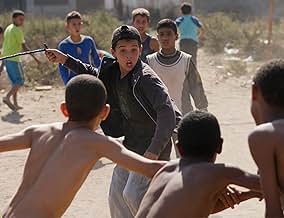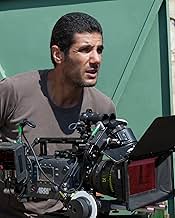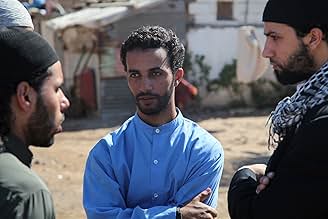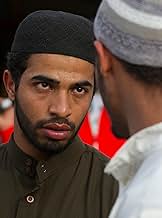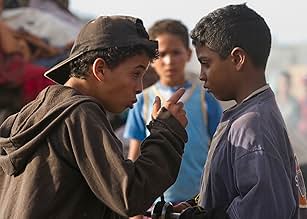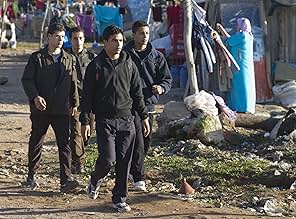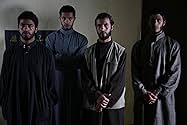IMDb RATING
7.3/10
2.1K
YOUR RATING
A fictional account of the lives of the men responsible for the suicide bombings in Casablanca in 2003.A fictional account of the lives of the men responsible for the suicide bombings in Casablanca in 2003.A fictional account of the lives of the men responsible for the suicide bombings in Casablanca in 2003.
- Director
- Writers
- Stars
- Awards
- 10 wins & 5 nominations total
Abdelhakim Rachid
- Yachine
- (as Abdelhakim Rachi)
- …
Rabii Benjhail Tadlaoui
- Zaid
- (as Rabii Tadlaoui)
- Director
- Writers
- All cast & crew
- Production, box office & more at IMDbPro
Featured reviews
The cinematic piece offers a breath of fresh air when it comes to the stigmatized dehumanization of muslim youth, and brings to light the root of the issue instead of the unreconsilable outcome.
A difficult film to review objectively because of the content. It was extremely well done whatever your reaction might be to the story that was told. For those open to the excellent message contained in this film, it would be well worthwhile to watch. To those who see the world solely in black & white, it may, unfortunately, further fuel their prejudices
The story begins with a group of boys born and raised in the squalor of a Moroccan slum. Their lives are shaped by poverty, exploitation within their own community, harassment by the police and indifference to their plight from the government. They develop into young men who have little hope for the future, who use & deal drugs, who get drunk and into fights, who commit crimes & have no hope of meaningful employment, who are harassed & exploited by the police, and who in some cases are put in prison.
At this point in the story some of the young men are rescued ( or further exploited, depending on your point of view) by a group of Muslim men. The young men become part of a community that support & care for one another, pray & receive religious instruction, stop their anti-social behavior, cease committing petty crimes and seem on the road to being model citizens.
But then their education goes beyond the fundamentals of Islam and they learn of the persecution of others of their faith around the world. They are trained in hand to hand combat and indoctrinated with the view that martyrdom for the faith and for the defense of their people is an honorable objective that will ensure their entry into paradise and provide comfort to their families in this life.
To western minds this would appear to be mindless extremism and sacrifice but to be fair virtually every nation and every ideology fights its battles with armies recruited from poor, under-educated young men who have few prospects for the good life experienced by those who want to use them to defend their comfortable status quo or who want them to sacrifice themselves for some cause from which they, the recruiters, would reap the rewards. Whether the exploiters glorify the prospect of an honorable death for king & country, for democracy, for democratic freedom or for religious survival, it amounts to the same thing attracting the disenfranchised through propaganda and short-term rewards to fight and die while those who reap the potential benefits stay out of harm's way.
The message of the film may help some to better understand the circumstances that inspire the recruitment of Islamic fundamentalists who are willing to become martyrs for their faith, but more generally it should open some eyes to the exploitation of marginalized, disaffected people for some "grand cause," whether it is supposedly to preserve a western capitalistic way of life (though certainly not a life enjoyed by most of those recruited) or to restore lost glory (as was twice the case in Germany) or supposedly at the behest of the semi-divine emperor of Japan or to defend the faith as in the crusades or Israeli conflicts and so on throughout history. Glorifying sacrifice from those who have little to lose, by those who have much to gain, is neither unique to Islamic fundamentalists nor to the 21st century. The conditions that produce the ready supply of recruits used to wage wars and terrorism are nothing new either.
Definitely a thought-provoking, well produced film.
The story begins with a group of boys born and raised in the squalor of a Moroccan slum. Their lives are shaped by poverty, exploitation within their own community, harassment by the police and indifference to their plight from the government. They develop into young men who have little hope for the future, who use & deal drugs, who get drunk and into fights, who commit crimes & have no hope of meaningful employment, who are harassed & exploited by the police, and who in some cases are put in prison.
At this point in the story some of the young men are rescued ( or further exploited, depending on your point of view) by a group of Muslim men. The young men become part of a community that support & care for one another, pray & receive religious instruction, stop their anti-social behavior, cease committing petty crimes and seem on the road to being model citizens.
But then their education goes beyond the fundamentals of Islam and they learn of the persecution of others of their faith around the world. They are trained in hand to hand combat and indoctrinated with the view that martyrdom for the faith and for the defense of their people is an honorable objective that will ensure their entry into paradise and provide comfort to their families in this life.
To western minds this would appear to be mindless extremism and sacrifice but to be fair virtually every nation and every ideology fights its battles with armies recruited from poor, under-educated young men who have few prospects for the good life experienced by those who want to use them to defend their comfortable status quo or who want them to sacrifice themselves for some cause from which they, the recruiters, would reap the rewards. Whether the exploiters glorify the prospect of an honorable death for king & country, for democracy, for democratic freedom or for religious survival, it amounts to the same thing attracting the disenfranchised through propaganda and short-term rewards to fight and die while those who reap the potential benefits stay out of harm's way.
The message of the film may help some to better understand the circumstances that inspire the recruitment of Islamic fundamentalists who are willing to become martyrs for their faith, but more generally it should open some eyes to the exploitation of marginalized, disaffected people for some "grand cause," whether it is supposedly to preserve a western capitalistic way of life (though certainly not a life enjoyed by most of those recruited) or to restore lost glory (as was twice the case in Germany) or supposedly at the behest of the semi-divine emperor of Japan or to defend the faith as in the crusades or Israeli conflicts and so on throughout history. Glorifying sacrifice from those who have little to lose, by those who have much to gain, is neither unique to Islamic fundamentalists nor to the 21st century. The conditions that produce the ready supply of recruits used to wage wars and terrorism are nothing new either.
Definitely a thought-provoking, well produced film.
This is an immaculate movie that show many stories in one. Yes it's about how kids became terrorists, but is about much more. About poverty, about the mind's fight for peace in an environment with limited choices and opportunities. Either all out in crime or all out in (the wrong aspects of manipulated) religion or be the chump in the middle being slapped around ..until you are pushed to an extreme side. Where wolves- like in every nation- are ready to recruit these poor, non educated, hopeless young men with a promise of either riches in this world or in the afterworld. When it comes down to it...every army or gang is filled with these kind of men..albeit there can be a big difference of course in how poor or hopeless the young men/women are depending on where they grew up and reside.
The need for a sense of direction and purpose. Love and fear in a dog eat dog world. How to stay clean in so much dirt ?
I love how this film gives a voice to this reality. This is (also) what art is all about..to voice that what needs voicing or to give a voice to those that are screaming but aren't seen nor heard. Expression is what saves one from imploding or exploding ..carrying so much weight.
The director has that privilege of expression, that the people in the movie dont have. But still..it gives a voice..even ifs not directly theirs.
And furthermore to hopefully open the eyes of people that dont know about these lives, and complexity of life in general. To those that are open to it.
Beautifully filmed. A favourite.
I finally found a version of this film that was not dubbed into French! Over the years I have downloaded, rented and started watching it but gave up as the language was not the original Darija.
I watched the film with a sense of mounting horror and despair. There was not a moment of fat in this feature that told the story of various youths and their families' lives in the sprawling slum of Sidi Moumen. The shantytown had been allowed to exist and enlarge during "Les Années de Plomb" (the years of lead) under the careless watch of King Hassan ll. There is no way out apart from crime, prostitution or marriage to a rich person if one is good looking.
We see the lives of the protagonists from childhood through to the atrocities and how they are twisted and formed by the utter hopelessness of their situation. The local Mafias act on behalf of the cops until the latter decide an arrest is needed, then someone is casually thrown in jail. One of these is Hamid, rough elder brother of Tarek who is ensnared by radical Islam in the klink. Unfolding events trap others too, including Tarek and his friends.
There is a theme throughout the film of hidden homosexuality. Nabil is raped as a preteen and is Tarek's lover later when they are teens despite the latter being in love with Ghislaine, a local beauty. The repair shop's boss tries it on with Nabil too and this is the beginning of the lads' descent into fundamentalism. It's quite subtly done in the film. This is Morocco after all and such things are not spoken about.
The radicalisers are grotesquely true to life in their way of caging and channeling their victims into believing that martyrdom while killing apostates and non-Muslims is acceptable, nay desirable. Of course, they would never go on a mission themselves.
The part that made me weep was when the lads were taken on a solidarity holiday to the mountains just before their mission. These young men were not evil, they were kids who had been deluded and deceived, splashing in mountain streams that they had never had the opportunity to see before and playing football. They had been seduced to terrible effect.
And now I have to declare my interest. I live in Morocco although not in Casablanca. The new tramway extends all the way to Sidi Moumen giving new opportunities to the remaining slums. Morocco has clamped down on jihadists using a network of spies and informers. However, I was by chance in Casablanca the night of the attacks, staying in a hotel 200 yards away from the Safir which was partially blown up. Like an idiot, having heard the explosion from my hotel, I went out to see what had happened. I got about 40 yards down the street before I was lifted off my feet by two burly cops and dragged back to my hotel and slapped hard once they had got me into reception.
I was bewildered ever since and have never truly understood the attraction of being radicalised, either these guys or other terrorists elsewhere. This masterpiece of a film goes a long way to explaining the process to me.
I watched the film with a sense of mounting horror and despair. There was not a moment of fat in this feature that told the story of various youths and their families' lives in the sprawling slum of Sidi Moumen. The shantytown had been allowed to exist and enlarge during "Les Années de Plomb" (the years of lead) under the careless watch of King Hassan ll. There is no way out apart from crime, prostitution or marriage to a rich person if one is good looking.
We see the lives of the protagonists from childhood through to the atrocities and how they are twisted and formed by the utter hopelessness of their situation. The local Mafias act on behalf of the cops until the latter decide an arrest is needed, then someone is casually thrown in jail. One of these is Hamid, rough elder brother of Tarek who is ensnared by radical Islam in the klink. Unfolding events trap others too, including Tarek and his friends.
There is a theme throughout the film of hidden homosexuality. Nabil is raped as a preteen and is Tarek's lover later when they are teens despite the latter being in love with Ghislaine, a local beauty. The repair shop's boss tries it on with Nabil too and this is the beginning of the lads' descent into fundamentalism. It's quite subtly done in the film. This is Morocco after all and such things are not spoken about.
The radicalisers are grotesquely true to life in their way of caging and channeling their victims into believing that martyrdom while killing apostates and non-Muslims is acceptable, nay desirable. Of course, they would never go on a mission themselves.
The part that made me weep was when the lads were taken on a solidarity holiday to the mountains just before their mission. These young men were not evil, they were kids who had been deluded and deceived, splashing in mountain streams that they had never had the opportunity to see before and playing football. They had been seduced to terrible effect.
And now I have to declare my interest. I live in Morocco although not in Casablanca. The new tramway extends all the way to Sidi Moumen giving new opportunities to the remaining slums. Morocco has clamped down on jihadists using a network of spies and informers. However, I was by chance in Casablanca the night of the attacks, staying in a hotel 200 yards away from the Safir which was partially blown up. Like an idiot, having heard the explosion from my hotel, I went out to see what had happened. I got about 40 yards down the street before I was lifted off my feet by two burly cops and dragged back to my hotel and slapped hard once they had got me into reception.
I was bewildered ever since and have never truly understood the attraction of being radicalised, either these guys or other terrorists elsewhere. This masterpiece of a film goes a long way to explaining the process to me.
Based on the real multiple bombings that took place on May 16, 2003 in Casablanca, Morocco, the film follows its main characters over a period of 10 years, as they transition from boys to young men.
There's a lot that's powerful here, and there is much that has the ring of truth in this journey into darkness. But compared to (for example), Hany Abu-Assad's more complex and richer 'Paradise Now' there's also something a bit schematic. The reasons behind the transformation of these once sweet young men into bombers– poverty, hopelessness, an overly macho culture – are certainly true, but they're also familiar. It doesn't quite feel like we're digging deeper into their souls.
I also wish the villains of the piece, both Jihadist and 'civilian' were a little less on-the-nose, a little less mustache twirling. In terms of those men who are recruiting the boys, I missed the charisma that I assume must be part of the recruitment process.
Much like Ayouch's earlier 'Ali Zoaua: Price of the Streets', also about middle -eastern street kids, while the film is intelligent and interesting, it feels like it should be even more emotionally devastating than it ultimately is. That said, it's good enough that I could imagine re-visiting it, and seeing if it pulls me in even deeper on a second viewing.
There's a lot that's powerful here, and there is much that has the ring of truth in this journey into darkness. But compared to (for example), Hany Abu-Assad's more complex and richer 'Paradise Now' there's also something a bit schematic. The reasons behind the transformation of these once sweet young men into bombers– poverty, hopelessness, an overly macho culture – are certainly true, but they're also familiar. It doesn't quite feel like we're digging deeper into their souls.
I also wish the villains of the piece, both Jihadist and 'civilian' were a little less on-the-nose, a little less mustache twirling. In terms of those men who are recruiting the boys, I missed the charisma that I assume must be part of the recruitment process.
Much like Ayouch's earlier 'Ali Zoaua: Price of the Streets', also about middle -eastern street kids, while the film is intelligent and interesting, it feels like it should be even more emotionally devastating than it ultimately is. That said, it's good enough that I could imagine re-visiting it, and seeing if it pulls me in even deeper on a second viewing.
Did you know
- TriviaOfficial submission of Morocco to the Oscars 2014 best foreign language film category.
- SoundtracksGouli je t'aime
by Youmni Rabii & City 16
Lyricst & Composer - Youmni Abdellatif
Les chevaux de Dieu (Bande originale du film)
©Les Films du Nouveau Monde, 2013
- How long is Horses of God?Powered by Alexa
Details
Box office
- Budget
- $3,000,000 (estimated)
- Gross US & Canada
- $14,817
- Opening weekend US & Canada
- $2,251
- May 18, 2014
- Gross worldwide
- $96,277
- Runtime1 hour 55 minutes
- Color
- Sound mix
- Aspect ratio
- 1.85 : 1
Contribute to this page
Suggest an edit or add missing content



